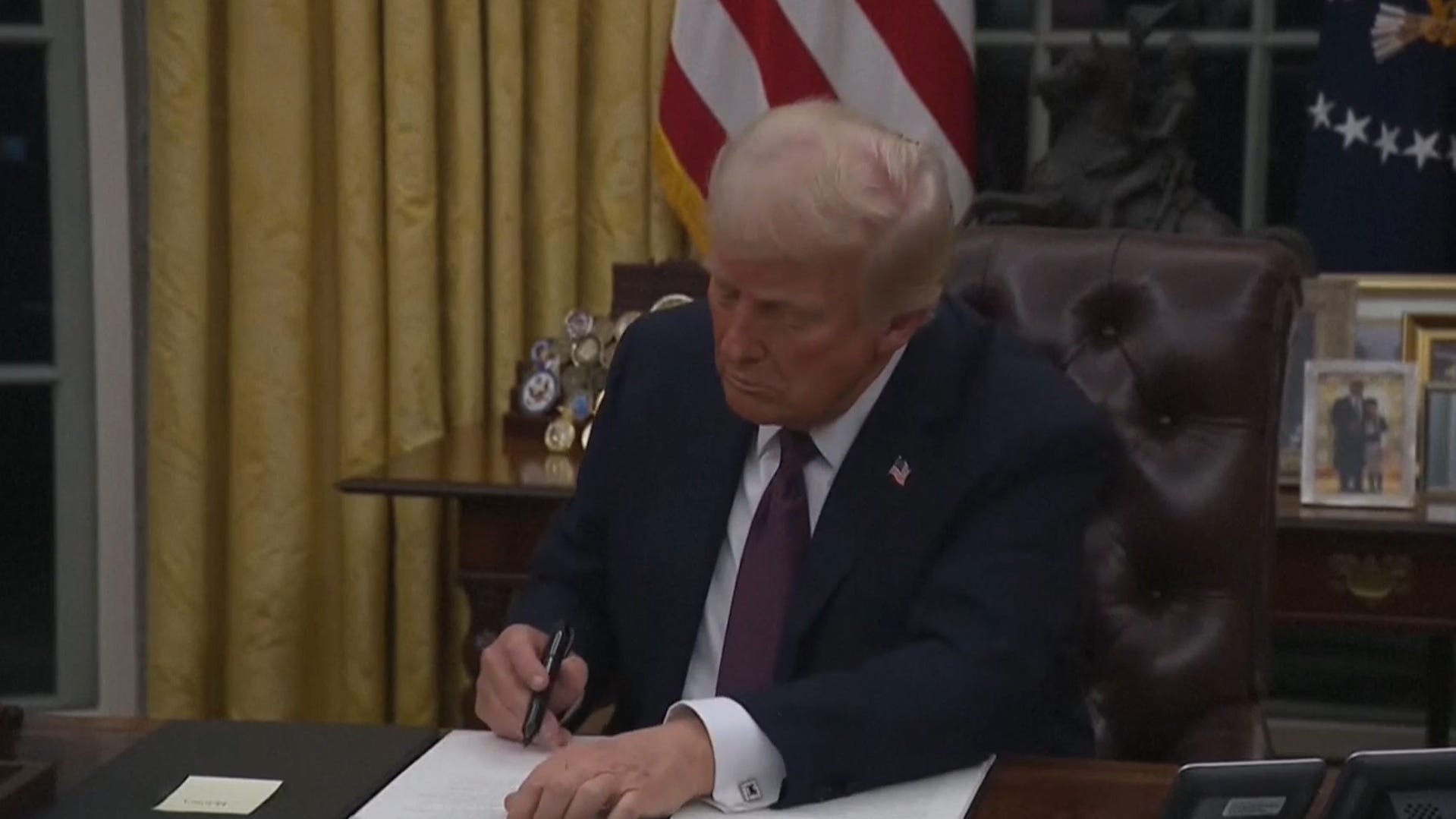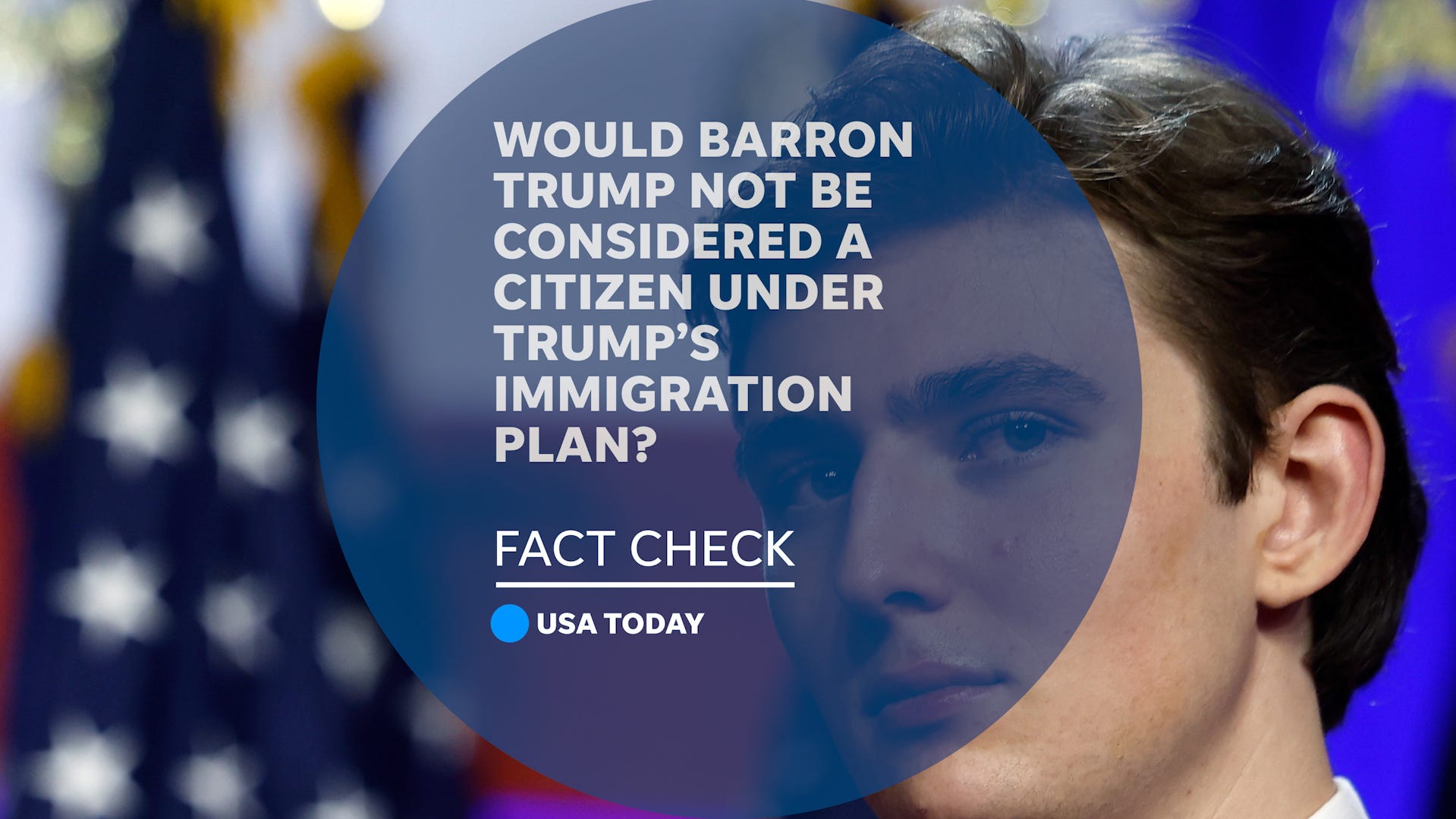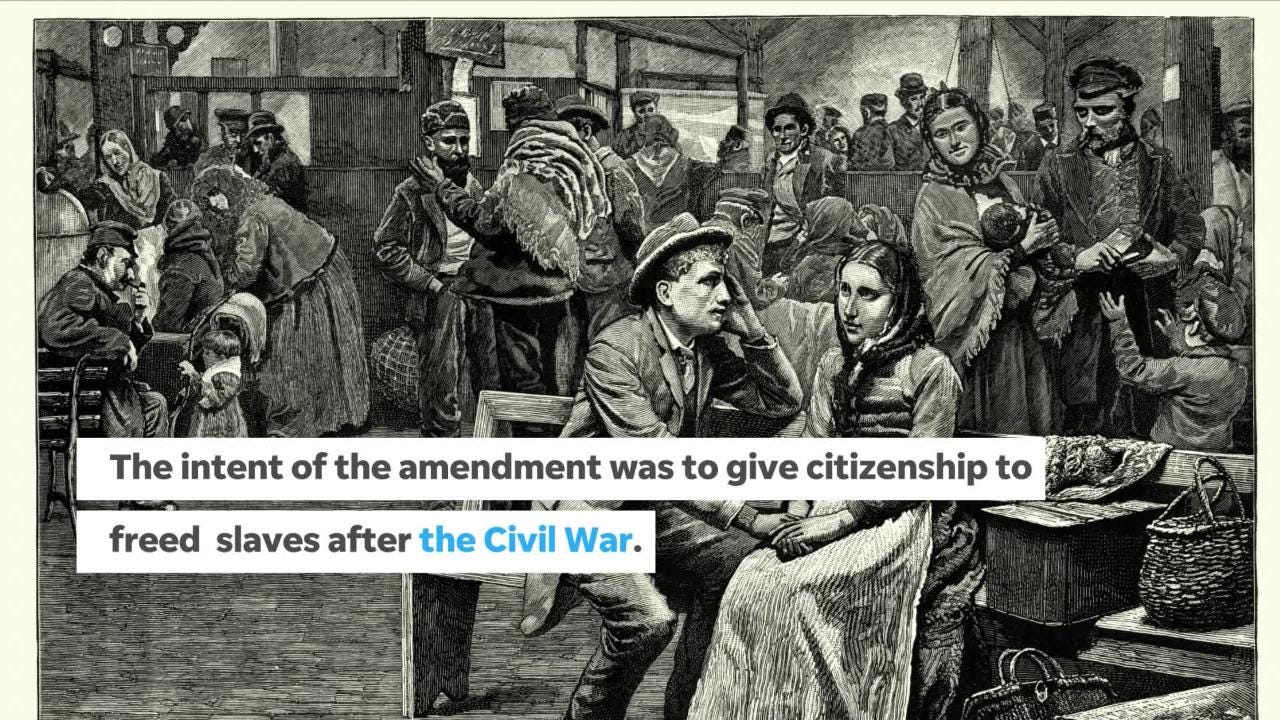Is birthright citizenship in the Constitution? Can Trump end it? 18 states sue

Amidst an onslaught of executive orders that President Donald Trump issued on his first day back in the White House was one ending automatic citizenship for U.S.-born children of immigrants in the country illegally, fulfilling a vow he made during his campaign.
"The federal government will not recognize automatic birthright citizenship for children of illegal aliens born in the United States. We are also going to enhance vetting and screening of illegal aliens," said a Trump official in a briefing on Monday.
On Tuesday, a coalition of 18 states sued Trump and federal agencies in U.S. District Court in Massachusetts, claiming the order violates the Constitution. Immigrant and civil rights advocates, including the American Civil Liberties Union, filed a lawsuit against the order almost immediately Monday evening.
Birthright citizenship is enshrined in the 14th Amendment to the U.S. Constitution. Can Trump just change it?
Can Trump end birthright citizenship with an executive order?
That depends on how the legal battle(s) shake out.
An attempt to change the existing amendment can only be done through a new constitutional amendment, which requires either a joint resolution passed by two-thirds of both the House of Representatives and the Senate, or a convention called by Congress in response to two-thirds of state legislatures requesting one.
However, Trump's order doesn't change the wording. Instead, it attempts to reinterpret a clause in the amendment to no longer apply to large numbers of people that it used to.
The Citizenship Clause of the Fourteenth Amendment states, simply: “All persons born or naturalized in the United States, and subject to the jurisdiction thereof, are citizens of the United States and of the State wherein they reside.” Previously, "subject to the jurisdiction thereof" was interpreted by the U.S. Supreme Court to mean that children of "citizens or subjects of foreign states" were not eligible for citizenship. Under Trump's order, this would now also include people born in the U.S.:
- When that person’s mother was unlawfully present in the United States and the father was not a United States citizen or lawful permanent resident at the time of said person’s birth, or
- When that person’s mother’s presence in the United States at the time of said person’s birth was lawful but temporary (such as, but not limited to, visiting the United States under a Visa Waiver Program or on a student, work, or tourist visa) and the father was not a United States citizen or lawful permanent resident at the time of said person’s birth.
“Denying citizenship to U.S.-born children is not only unconstitutional — it’s also a reckless and ruthless repudiation of American values. Birthright citizenship is part of what makes the United States the strong and dynamic nation that it is," Anthony D. Romero, executive director of the American Civil Liberties Union, said in a statement. "This order seeks to repeat one of the gravest errors in American history, by creating a permanent subclass of people born in the U.S. who are denied full rights as Americans.”
Even Trump previously admitted the executive order might not work. In a wide-ranging interview with NBC's "Meet the Press" last month, he talked about his desire to mass deport huge numbers of people in the country illegally and said he planned to ban "birthright citizenship" through executive order on his first day in office "if we can.
"We'll maybe have to go back to the people," he said. "But we have to end it. We're the only country that has it, you know."
Currently, 65 countries have some form of birthright citizenship and 33, including the U.S., have unrestricted birthright citizenship, according to worldpopulationreview.com,
When would birthright citizenship end under Trump's executive order?
According to the order, it would apply to people born in the United States after 30 days from Monday, Jan. 20, 2025.
Is Trump's executive order ending birthright citizenship retroactive?
No, although Trump may also issue further orders in the future.
Would ending birthright citizenship affect Barron Trump?

Social media posts wondering if the executive order would also kick the president's son Barron out of the country have gone viral since November, along with concerns about three more of Trump's five children. Don Jr, Ivanka and Eric were all born before their mother Ivana became a U.S. citizen in 1988.
Since Trump was a U.S. citizen at the time of all of his children's births, the changes to birthright citizenship would not apply.
Would ending birthright citizenship affect Kamala Harris?
The executive order is not retroactive and is not seeking to remove existing citizenship status.
However, under Trump's order, someone born in the same circumstances that former Vice President Kamala Harris was born in after February 19, 2025, might not be a naturalized U.S. citizen.
Harris was born in 1964 in Oakland, California to parents from Jamaica and India. Her birth certificate does not note her parents' citizenship status at the time, Reuters reported. If neither of them were citizens at her birth, then under this order she would not have been a citizen either.
What is birthright citizenship?

Birthright citizenship means anyone born in a country is automatically a citizen of that country. Such people are called "natural citizens." Different countries with birthright citizenship laws may have different restrictions for eligibility.
Birthright citizenship was part of English common law and referred to as jus soli ("right of the soil").
Does the United States have birthright citizenship?
Yes. It's enshrined in the 14th Amendment to the U.S. Constitution.
What does the 14th Amendment say about birthright citizenship?
The 14th Amendment to the U.S. Constitution was passed in 1866, less than a year after the end of the Civil War. Among other things, it overruled the previous Dred Scott ruling stating that enslaved people, even if born here, could never become citizens of the United States.
The very first sentence of the amendment is the Citizenship Clause: "All persons born or naturalized in the United States, and subject to the jurisdiction thereof, are citizens of the United States and of the state wherein they reside."
The rest of the first section grants citizenship to all persons "born or naturalized in the United States," including formerly enslaved people, and provides them with "equal protection of the laws" while preventing states from passing laws to deprive them of it. Without that guarantee, Black Americans would not have had the right to own property or move freely around the U.S.
Other sections in the 14th Amendment regulate how representatives are apportioned; block anyone who has engaged in insurrection against the U.S. from being a senator, representative, president or vice president; assert that the validity of the country's public debt shall not be questioned; and provide Congress with the power to enforce the rest of it.
Has the Supreme Court ruled on birthright citizenship?
Yes, in two notable cases.
In 1898 the Supreme Court ruled in United States v. Wong Kim Ark, after the U.S.-born Wong took a trip to China and was refused re-entry to the United States after a trip to China. Up until 1882, there were no immigration laws in the U.S. so it hadn't been an issue before, but the Chinese Exclusion Acts restricted Chinese immigration and prohibited Chinese immigrants from becoming naturalized citizens.
Twenty-five years earlier, in a series of cases called the "Slaughter-House Cases," the Supreme Court had clarified that the citizenship clause did not apply to children of "citizens or subjects of foreign states." The district attorney for the U.S., in this case, claimed this meant Wong was therefore not a natural-born citizen under the 14th Amendment.
In a 6-2 ruling that has stood the test of time, the court determined that because he was born on U.S. soil and his parents were not "employed in any diplomatic or official capacity under the Emperor of China," Wong was a U.S. citizen.
The court ruled again in 1982 when Texas attempted to withhold education funds for the children of undocumented immigrants. In Plyler v. Doe, the court reasoned that undocumented immigrants are people "in any ordinary sense of the term" and are consequently afforded 14th Amendment protections.
Who is not a citizen even if they're born in the United States?
According to the American Immigration Council, before the executive order American birthright citizenship was available to anyone born in the U.S. except for:
- Children of foreign diplomats
- Children born to soldiers considered enemy invaders during a hostile occupation of the U.S.
- People born in American Samoa's unincorporated territories
Indigenous peoples born in the U.S. were excluded until the Indian Citizenship Act of 1924.
Do any other countries besides the U.S. have birthright citizenship?
Currently, 33 countries, including the U.S., and two territories have unrestricted birthright citizenship, according to worldpopulationreview.com, and another 32 have some sort of restricted birthright citizenship. Nearly all of them are in North, Central, or South America, possibly due to colonizing European countries who were hoping to entice settlers to the New World with relaxed, immigration-friendly laws.
What has Gov. DeSantis said about birthright citizenship?
"This idea that you can come across the border, two days later have a child and somehow that's an American citizen, that was not the original understanding of the 14th Amendment and so we'll take action to force a clarification of that," Trump's former opponent Gov. Ron DeSantis said in June, criticizing what he described as "birth tourism."
This is consistent with what he said on the gubernatorial campaign trail five years ago when asked about Trump's plan to end birthright citizenship, although he was less confident then that an executive order would pass.
In a 2018 FOX News interview, DeSantis said he didn't think birthright citizenship was a good idea but didn't think courts at the time would uphold an executive order banning it. "The way the courts have ruled on it," he said, "I think there's a question about, can you do an executive order? Can you do legislation? Do you need an amendment?"
DeSantis went into more detail when asked about it at a Manatee County rally in 2018.
“I’ve typically viewed it as probably the courts weren’t going to reevaluate it and so when we’ve discussed should we bring this up in Congress and vote on it I’m like: ‘Look I don’t really want birthright citizenship but I think it would get struck down,’ ” he said, pointing out that the makeup of the Supreme Court has changed a lot in just a few years. "So I think the president — could you do this by executive order and have it upheld? I don’t know that.”
Before he dropped out of the 2024 presidential race, DeSantis campaigned with a similarly aggressive attitude against immigration after a new state law last year imposed harsher penalties and new restrictions on undocumented immigrants in Florida.
It was called one of the toughest anti-immigration laws in the country. DeSantis also vowed then to end birthright citizenship.
Contributors: Allie Feinberg, Arizona Republic; John Kenney, Lauren Villagran, Paste BN NETWORK - Florida Capital Bureau; Zac Anderson, Sarasota Herald-Tribune
(This story was updated with new information.)